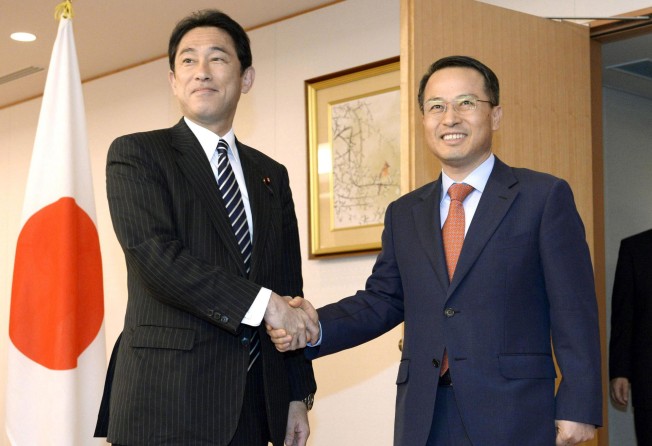Seoul, Tokyo move to mend strained ties
High-level foreign ministry leaders meet in Tokyo to discuss fractious ties, but there is no sign that a leadership summit is on the cards

Japan and South Korea yesterday took a conciliatory step towards mending ties frayed by months of low-level squabbling with a courtesy call between foreign ministers.
South Korea's First Vice- Foreign Minister Kim Kyou-hyun, who has been visiting Japan this week, met with Japanese Foreign Minister Fumio Kishida at his office in Tokyo.
The pair were pictured shaking hands and smiling.
Their meeting came as the two US allies have struggled to end diplomatic discord over Japan's wartime aggression in Korea, a territorial dispute and a general animosity that soured relations over the last year.
The tension has obviated any meeting between Japanese Prime Minister Shinzo Abe and South Korean President Park Geun-hye, both of whom have only been in power for a few months.
"South Korea is an important partner and neighbour that shares fundamental values and interests. I hope to enhance bilateral relations by continuing our close communication," Kishida said at the start of the meeting.
Kim echoed Kishida's statement, saying: "South Korea and Japan are partners who should work together for the peace and stability of the region."
Of his Japanese hosts, Kim said: "We hope they will make efforts in approaching the issue by taking the long and broad view in resolving the difficult problems that we have had for some time."
The two men did not discuss a putative summit in any detail, Kishida said.
Japan and South Korea have many issues of common interest, including pushing North Korea to give up its nuclear weapons programme and working with China, the region's biggest economy.
But Tokyo and Seoul have long quarrelled over reparations for Korean "comfort women" who were forced to provide sex to Japanese soldiers during the second world war, as well as for men who had to perform forced labour.
Japan maintains the compensation issue was settled in 1965 when the two countries normalised relations. But South Korean courts have ruled that individuals can still seek payments for damages.
Asian nations have also been wary of the rise of Abe, who is known for nationalistic views, including of Japan's war-time history. However, some commentators speculate that if, as expected, Abe does well in coming upper house elections, South Korea may find it easier to deal with him because he will represent a stability in Japanese politics that has long been missing.
The Japan-South Korea dispute intensified last August when the then President Lee Myung-bak became the first South Korean leader to set foot on the sparsely populated Dokdo islands, which are claimed by both countries but controlled by Seoul. Tokyo calls the islands Takeshima.
The months since President Park took office in February have also been characterised by discord.
Park pointedly broke with a tradition set by four South Korean presidents by making China her first diplomatic port of call in Asia. Her four predecessors - Kim Young-sam, Kim Dae-jung, Roh Moo-hyun and Lee Myung-bak - met counterparts in Tokyo before travelling to China.
Additional reporting by Associated Press